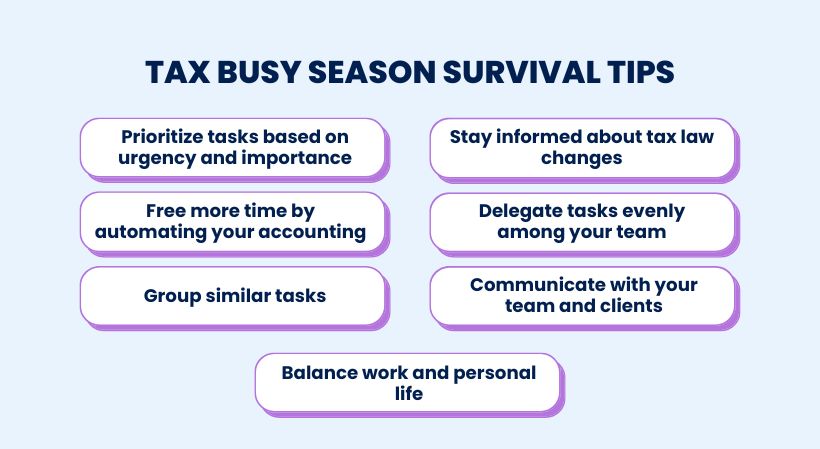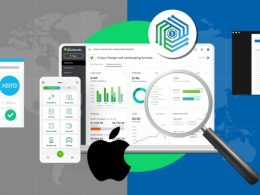Every accountant knows that time of year when life feels like running on a hamster wheel every day—welcome to busy season accounting. While accounting is already a challenging part of any business, the busy season cranks the pressure up to exhausting levels.
There’s no need to dread sleepless nights, endless spreadsheets, or costly mistakes this busy season. Want to stay sharp, beat burnout, and crush the chaos? We’ve rounded up 7 practical tips to help you not just survive but thrive during the busy accounting season. Let’s dive in!
Contents
- What is the busy season for accountants?
- Main drivers of the busy accounting season
- 7 tax busy season survival tips for accountants
- Tip #1. Prioritize tasks based on urgency and importance
- Tip #2. Free more time by automating your accounting
- Tip #3. Group similar tasks
- Tip #4. Stay informed about tax law changes
- Tip #5. Delegate tasks evenly among your team
- Tip #6. Communicate with your team and clients
- Tip #7. Balance work and personal life while you’re busy accounting
What is the busy season for accountants?
The busiest time of year for accountants typically runs from January to April as they gear up for the tax filing deadline on April 15th. It’s the season of crunching numbers, finalizing year-end financials, preparing tax returns, and meeting compliance deadlines.
But the hustle doesn’t stop there. Busy seasons pop up throughout the year, depending on the specialty:
- Corporate accountants dive into year-end closes in December and January or tackle quarterly reporting deadlines.
- Auditors hit their stride early in the year, right after the fiscal year-ends.
- Ecommerce and retail accountants get swamped with post-holiday sales reports in January.
Tax season is the big game for accountants, but accounting has its share of busy periods to keep things lively year-round.
Main drivers of the busy accounting season
During the busy season, you’re bound to encounter these three horsemen of the apocalypse:
- Tax deadlines;
- Year-end closing;
- Quarterly reporting.
Let’s break them down, because knowing your enemy is half the battle.
1. Tax deadlines
Meeting tax deadlines is one of the biggest drivers of the accounting busy season. Accountants are responsible for preparing, reviewing, and filing business and individual tax returns.
In the U.S., tax filings keep accountants busy year-round, with annual and quarterly deadlines:
- Annual taxes: Most Americans tackle federal income taxes by April 15.
- Quarterly taxes: Self-employed individuals and businesses make estimated payments on April 15, June 15, September 15, and January 15.
- Employment taxes: Employers stay on track with quarterly forms like Form 941.
Deadlines shift if they fall on a weekend or holiday. While January to April is the crunch time, quarterly deadlines keep the momentum going all year long.
To stay on track, accountants must:
- Keep up with the latest tax laws and regulations;
- Gather and organize all necessary documents;
- File returns accurately and on time.
Why is it important? Missing these deadlines can lead to hefty penalties:
- Late filing penalty: 5% of unpaid taxes per month, up to 25% total. If the return is more than 60 days late, the minimum penalty is $485 or 100% of the tax owed, whichever is less.
- Late payment penalty: 0.5% of monthly unpaid taxes, capped at 25% total. If both penalties apply, the combined charge is 5% per month.
- Interest charges: Added daily on top of penalties until the full amount is paid.
2. Year-end closing
Year-end closing is when companies wrap up their finances by checking accounts and ensuring all transactions are recorded accurately and preparing for the next. Here’s how it works:
- Adjusting entries: Recording any missing revenues or expenses to ensure everything from the year is accounted for.
- Account reconciliation: Reconciling accounts against bank statements and other records to catch and fix any discrepancies.
- Financial statements: Creating key reports—like the income statement, balance sheet, and cash flow statement—to see how the year shaped up.
- Closing accounts: Closing temporary accounts (revenues and expenses) and rolling their totals into retained earnings.
- Starting fresh: Updating records and building a game plan for the new year based on the insights you’ve gained.
3. Quarterly reporting
Quarterly reporting is how publicly traded companies share updates every quarter to keep everyone in the loop. These reports break down important numbers like revenues, expenses, profits, and cash flows, using documents like the income statement, balance sheet, and cash flow statement.
| In the U.S., these updates are filed as Form 10-Q with the SEC, giving investors and analysts a clear snapshot of how the company is performing. |
7 tax busy season survival tips for accountants
Now you know what to expect. Preparing in advance is key, so we’ve compiled seven best practices to help you handle the challenges of the busy season with confidence and dignity.

Tip #1. Prioritize tasks based on urgency and importance
During the busy season, accountants face a mountain of tasks, making smart prioritization a must. Here’s how you can do it:
- Urgent and important: These mission-critical tasks—like tax filings and urgent client deliverables—demand your immediate focus. Tackle them immediately to avoid penalties and maintain client trust.
- Important but not urgent: Think long-term here. Strategic planning, professional development, and process improvements fall into this group. Schedule these during quieter times to set yourself up for future success.
- Urgent but less important: Quick actions like routine emails and scheduling meetings live here. Delegate, automate or handle them swiftly without letting them derail your focus.
- Not urgent and not important: Distractions like social media scrolling or non-essential browsing belong in this bucket. Minimize or eliminate these to stay productive.
By prioritizing tasks, you’ll tackle what matters most, stay on top of deadlines, and keep your eye on the bigger picture—without getting lost in the busy season shuffle.
| Pro tip: Use technology to automate repetitive tasks using accounting software to free up time for high-priority work. Utilize workflow management tools to track deadlines and monitor progress effectively. |
Tip #2. Free more time by automating your accounting
Busy season accounting involves high-pressure tasks and accountants often trade their usual 40-hour weeks for marathon 50 to 80-hour sessions packed with high-stakes tasks. It’s a nonstop race to meet deadlines, driven by client demands, firm expectations, and role-specific challenges. But here’s the catch—working longer doesn’t always mean working more efficiently.
This is where automation tools like Synder step in. By cutting out manual tasks, speeding up workflows, and keeping everything on track, Synder helps you thrive when the pressure is on.
Synder effortlessly syncs transaction data from over 30 platforms—sales channels, payment gateways, you name it—without errors. And that’s just the start. Here’s how Synder takes the busy out of your busy season:
- Instant data sync: Managing multichannel client data has always been challenging. Synder integrates seamlessly with QuickBooks, Sage Intacct, or Xero, letting you choose between a big-picture view with Summary Sync or detailed transaction insights with Per Transaction Sync. From costs and products to taxes, Synder organizes client records effortlessly, freeing you from tedious manual input.
- Error-free reconciliation: Say goodbye to the headaches of reconciling transactions across multiple client platforms. Synder automates the reconciliation process, minimizing errors and duplicates, so you can trust that your client’s financial data is accurate and workflows run smoothly.
- Accurate tax calculation: Handling taxes for multiple clients with varying rates and locations can be overwhelming. Synder simplifies tax compliance by matching sales data with the correct tax codes in your accounting system, ensuring accurate calculations for each client, every time.
- Detailed profit & loss reports: Easy-to-generate profit and loss reports give you a clear view of your client’s financial performance. Customize reports for any time frame—monthly, yearly, or custom periods—and break them down by location, product, tax, or payment processor for actionable insights that help you guide your clients effectively.
With Synder handling these time-consuming tasks in the background, you can focus on what matters most—whether that’s strategizing for your clients or taking a well-deserved coffee break.
Want to see Synder in action? Join our Weekly Public Demo to discover how Synder can revolutionize your accounting workflow this busy season.
If you’re a business owner without much accounting experience or a professional to guide you, Synder has you covered. Through our collaboration with accounting firms, we’ve developed an Accountants Directory to help you connect with a trusted accountant who can provide the support you need.
Tip #3. Group similar tasks
When accounting workloads pile up, task batching can help you. Grouping similar tasks not only boosts efficiency but also reduces stress during peak seasons.
How to do it?
- Sort and categorize: Break your workload into groups based on function (e.g., data entry, client calls), complexity (e.g., simple returns, audits), or deadlines (e.g., urgent filings, long-term planning).
- Block out time: Schedule dedicated time slots for each category. Focusing on one type of task at a time keeps you in the zone and eliminates the chaos of multitasking.
- Focus fully: Remove distractions during your batching sessions. Techniques like the Pomodoro Method (work for 25 minutes, break for 5) can keep you sharp and prevent burnout.
Why does task batching work?
- Sharper focus: Switching between similar tasks reduces the mental strain of context switching and boosts accuracy.
- Faster workflow: Batching creates momentum, letting you tackle tasks more efficiently without constant interruptions.
- Less stress: A structured approach to your to-do list helps you stay organized, productive, and stress-free.
Having a clear sequence and plan will make it much easier to navigate through completed and feature tasks. This approach helps you handle the workload faster while avoiding confusion.
Tip #4. Stay informed about tax law changes
Getting through the busy season becomes even more challenging when tax laws and regulations change annually. Staying up to date is essential to ensure compliance and provide accurate service. After all, you wouldn’t want to redo a job because you missed a change in the law. To avoid this, keep informed through resources like:
- IRS Newswire: Subscribe to receive official tax law news directly from the Internal Revenue Service.
- AICPA CPA Insider: A weekly news bulletin from the American Institute of CPAs, offering insights into the accounting profession.
- Accounting Today: Subscribe for the latest tax news, insights, and tools relevant to accounting professionals.
- Deloitte Tax Alerts: Sign up to receive timely tax alerts and analyses straight to your inbox.
- EY Tax Alerts: Customize your subscription to receive updates on specific tax topics of interest.
- KPMG TaxNewsFlash: Access reports and updates on U.S. tax developments.
- PwC Insights: Receive daily summaries of tax, finance, and regulatory news to stay informed.
Tip #5. Delegate tasks evenly among your team
The busy season is a team effort, and no one should carry the load alone. Delegating tasks evenly keeps things running smoothly, prevents burnout, and ensures everyone stays on track.
How to delegate?
- Match tasks to strengths: For best results, match tasks to each team member’s skill and capacity, to not overload anyone.
- Set clear expectations: Tell everyone clearly who’s responsible for what and when.
- Leverage tech: Get task management tools, and use them to track what assignments you have, and when they’re due, so nothing falls through the cracks.
- Provide support: Ensure that team members have proper tools, resources, and guidance, to be able to carry out their tasks.
By spreading the workload and supporting your team, you can keep productivity high and stress low during the busiest times.
Tip #6. Communicate with your team and clients
During the busy season, clear and proactive communication will keep your team on board and your customers happy.
For your team:
- Set the stage early: From the start, you need to lay out team responsibilities, define roles, and set realistic deadlines. It helps keep everybody on the right track and working productively.
- Check in often: By combining formal team meetings with quick informal updates you can make sure everyone is on the same page and issues don’t snowball.
For your clients:
- Be proactive, not reactive: Don’t wait for them to ask—let your clients know when something is moving along, or if there’s a delay or update. Reducing confusion upfront will help prevent misunderstandings.
- Stay accessible: Email, calls, or secure portals can serve as effective communication channels, keeping your clients as informed as possible while you support them.
With some effort and the right tactic, effective communication will help improve team collaboration, reduce stress, and build stronger relationships with your clients in this very stressful time.
Tip #7. Balance work and personal life while you’re busy accounting
The accounting busy season can be a stressful time, but you don’t have to face it alone. Remind your friends and family that while this time of year takes more of your energy, understanding and love from them means everything.
Be true when rearranging your routines to satisfy your workload, and don’t shy away from asking for a little help along the way with something simple like walking the dog or running some errands. These small acts can take the edge off when you’re feeling stressed.
Give yourself short opportunities to carve out time with those you love, even if it’s for just a family dinner or a walk around the block. Don’t give up small joys entirely but if required, adjust routines, as they’ll keep you connected and grounded.
15 minutes of quality time can really lift your energy and remind your loved ones that they’re still a priority. Even small moments of balance can help you get through tax season with support and sanity.
Conclusion: How to prepare for the accounting busy season challenges
The busy season doesn’t have to mean stress, sleepless nights, and endless chaos. By prioritizing smart strategies—like task management, automation, effective communication, and work-life balance—you can turn this challenging time into an opportunity to shine.
Remember, success during the busy season isn’t just about working harder—it’s about working smarter. With the right strategies and tools, like Synder’s accounting automation solutions, you can handle the pressure with ease, keep your clients happy, and protect your well-being along the way.
Take control, stay focused, and power through the busy season with confidence. You’ve got this!
Share your experience
How do you tackle stress and keep productivity high at your busiest? When your workload increases, how do you handle that? Are there any tools or practices that you’ve come across that have boosted the quality of your work?







I love this post. The thing I like in your posts is that everything is in a detailed and learning manner.
I appreciated you pointing out that taxation services need to keep up during the tax season. My friend wants their tax season to be smooth. I should advise him to turn to a taxation service for proper guidance.
I liked how this post shared that maintaining a work-life balance is crucial even during tax season. My friend wants their tax season to be smooth. I should advise him to hire a tax accountant with years of experience in the field.
Nice Blog! Thanks for the information.